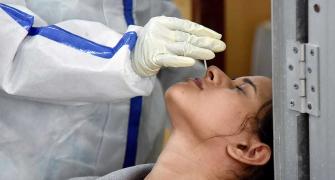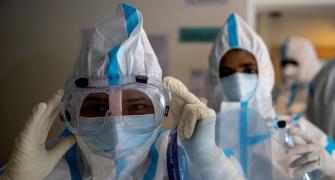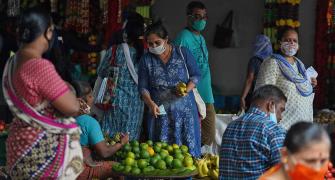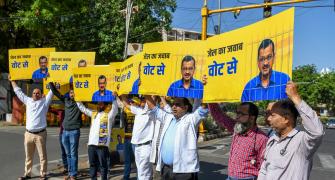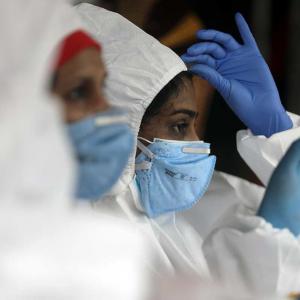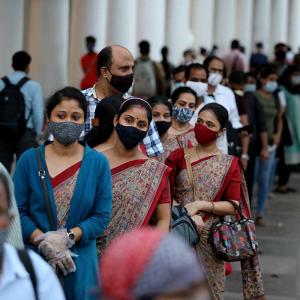'When restaurants are open, pubs are open and people are moving around, a second wave will happen because you are giving a chance for the virus to spread.'

As the world is slowly unlocking, WHO says the pandemic is accelerating worldwide with new cases soaring to a new high of almost two million.
While Europe and the UK are experiencing a second wave of coronavirus, India is only behind the US in the number of cases reported.
The number of deaths due to Covid in the US is a staggering 200,000, the highest in the world!
94,503 have died of the infection in India as of Monday, September 28, morning.
And there is a long way to go till the vaccine is available to all.
Dr Rakesh Mishra, director, Centre for Cellular and Molecular Biology (CCMB) tells Shobha Warrier/Rediff.com in the first of a two-part interview, "The virus is only seven-eight months old, and we have to have more understanding of its epidemiology to explain the waves."
Once again, the origin of the coronavirus has become a subject of debate globally. Last week, Chinese virologist Dr Li Ming said that the genome sequence of the virus had an inserted gene sequence, and hence it was man-made.
As a scientist who has conducted studies on the virus, how do you react to this?
From the very beginning, people had been raising questions about the origin of the virus.
By and large, most scientists are of the opinion that it is a natural virus.
It has probably come from bats and most likely, there is an intermediary host before it got contact with human beings.
Yes, it is difficult to trace and get the samples of the intermediary.
From our analysis, we didn't see any obvious reason to think that this virus was created in a lab.
Of course, man can make viruses in the lab, but there is no evidence to show that this was created by man in a lab.
She talks about inserted gene sequences...
I don't think there are any gene sequences inserted.
It is not just one scientist or one lab that has analysed this virus. Lakhs and lakhs of labs and scientists all over the world has analysed it.
I would say this is the most analysed genome of a virus. I can't understand what she saw which nobody else could see.
In April, Dr Luc Montagnier, a French virologist and Nobel Laureate, said it was man-made because of the presence of elements of HIV and a germ of malaria in the genome which he said was highly suspect. How do you react to this?
Because of these early suspicions, the scientist community looked at the virus very carefully, and the conclusion was that it was not a man-made virus.
It is conclusive that this is a natural virus.
Nobel Laureates also are normal human beings, and it doesn't mean that whatever a Nobel Laureate says is absolutely correct always.
Just because the virus originated in Wuhan and there is a virology lab in Wuhan does not mean the virus is created in the lab.
I would say there is no scientific evidence behind that argument.
We see that a second wave of infections has started in Europe and the UK. Does this mean before the virus disappears, there will be a second and third wave?
The simple answer is that the virus is only seven-eight months old, and we have to have more understanding of its epidemiology to explain the waves.
A virus which is very successful in spreading will be milder and less dangerous.
These days, those who spread the virus are asymptomatic. A virus that is milder has more chances spreading widely.
Yes, there will be a second wave, third wave, etc.
Is it inevitable?
 We can avoid it if people are careful.
We can avoid it if people are careful.
See, when restaurants are open, pubs are open and people are moving around, a second wave will happen because you are giving a chance for the virus to spread.
At the same time, you just cannot lock people inside all the time. We have to think of the economic implications also.
It is natural for second waves to happen.
The only thing we have to understand is, when activities increase, we must learn to take precautions like wearing a mask and keeping social distancing.
But it is very difficult to practice these two in pubs and restaurants where people go to eat, drink and talk.
That's why we see a second wave happening in Europe and the UK now.
The ICMR sero survey says there might have been 6.4 million infected cases in May when the official figure was around 76,000.
Since the first wave is still going up every day, if we were to go by the sero survey, will we attain herd immunity faster?
If we get herd immunity faster, it will be harmful for society as it means a very large number of people will get infected at one time.
So, it will be better if you get herd immunity in six months or one year. It means hospitals will not get crowded.
Now we know that we have estimated 100 times less in May itself. And there is no reason to believe that we are estimating any better now because the virus is spreading very fast.
So far, our hospitals have not run out of capacity very badly and we could manage the cases.
But if you get one lakh cases every day and it keeps increasing, very soon we will reach a situation where hospitals will be very crowded.
Then, we will not be able to save those who could have been otherwise saved because there will be a shortage of beds in the hospitals.
That's why we will have to pay a high price if we were to get herd immunity faster.
It is better to identify as many asymptomatic cases as possible and isolate them so that you can slow down the speed of the virus.
If we can do that for a year, hopefully there will be some other intervention to manage the virus.
The critical point is, we have to slow down the infection rate. Only that is going to make a difference.
Is a lockdown the only way to slow down the infection rate?
Lockdown is one of the options to slow down the virus. But we now know that it is a killer economically.
The other ways are, we test a large number of people and quarantine only those who are infected so that those who are not infected can work.
Then, of course, we have to have the discipline of using a mask and follow social distancing. And observe personal hygiene, too.
The more disciplined we are, the better we will be in our fight against the virus. This is going to be very crucial.
What the government can do is, test as many people as they can, and make the infected stay at home for 10 to 14 days.
If asymptomatic people move around, they will be spreading the virus unknowingly.
The virus is generally very mild and does not cause much harm to a majority of people,, but spreads very, very fast.

